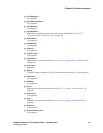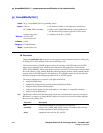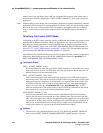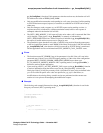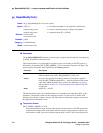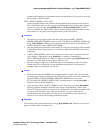Dialogic
®
Global Call IP Technology Guide — November 2007 401
Dialogic Corporation
accept proposed modification of call characteristics — gc_AcceptModifyCall( )
else /* not acceptable so respond with SIP Client Error */
/* final response of 488 Not Acceptable Here */
if (gc_RejectModifyCall(crn,
IPEC_SIPReasonStatus488NotAcceptableHere,
EV_ASYNC) < 0)
/* failure logic here */
break;
}
case GCEV_ACCEPT_MODIFY_CALL:
.
.
.
/* notify user of changed attribute */
.
.
.
break;
case GCEV_ACCEPT_MODIFY_CALL_FAIL:
/* process failure to change attribute */
if (gc_ResultInfo(&metaevent, &t_info) < 0)
{
/* failure logic here */
}
/* process information contained in t_info */
/* can optionally call gc_RejectModifyCall( ) to retry */
.
.
.
break;
case GCEV_REJECT_MODIFY_CALL:
.
.
.
/* notify user of rejected attribute */
.
.
.
break;
case GCEV_REJECT_MODIFY_CALL_FAIL:
/* process failure to reject request */
if (gc_ResultInfo(&metaevent, &t_info) < 0)
{
/* failure logic here */
}
/* process information contained in t_info */
/* can optionally call gc_RejectModifyCall( ) to retry */
.
.
.
break;
.
.
.
} /* endof switch */
} /* endof process_event function */
The following code example illustrates how the gc_AcceptModifyCall( ) function is used in the
third party call control (3PCC) operating mode.



